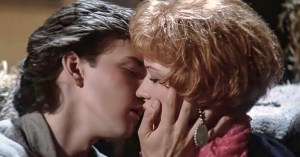Ana Kokkinos talks Blessed
RT catches up with the Australian director ahead of the release of her new drama

Australian director Ana Kokkinos (Head On, The Book of Revelation) returns this week with a new drama that follows several groups of children and their mothers on a long, grueling night in Melbourne. Entitled Blessed, it’s split into two halves — the first focused on the children and the second returning to the situations from the perspective of their mothers. Frances O’Connor, Miranda Otto and Beautiful Kate‘s Sophie Lowe feature in a heavy hitting drama that builds toward a hopeful catharsis. RT caught up with Kokkinos ahead of the film’s release this week.
RT: This is a pretty tough film, Ana — how have audiences been responding?
Ana Kokkinos: Well it’s an intensely moving film and it’s a very powerful film. The general feeling that I’ve had from audiences is that they find the film incredibly moving and richly rewarding. It’s really speaking to people on a deep level. It’s almost like it’s speaking to their souls. It’s great to feel that you can make an offer to audiences of a film that’s asking them to feel things and think about things as well. People are thinking about the film days after; often women have come up to me and said, ‘The first thing I did after seeing your film was to ring my children and make sure they’re okay.’ If the effect of the film is for mums and their kids to reconnect, or affirm that connection, then I’m happy.
Did you set out to explore mothers and children as a theme?
Yes. It’s based on a screenplay called
Who’s Afraid of the Working Class? and I felt, as we were developing the screenplay, one of ways to bind all the disparate stories in the play together was to hang the whole screenplay around mothers and children — that to me was the core emotional theme. There’s a line where Rhonda (played by Frances O’Connor) says ‘They’re my blessings and you’re not to touch them” — that really spoke to me. I guess what I set out to say was there’s a real sense that, despite the fact that all of those kids are in conflict with their mothers, that primal relationship is something that we always go back to in some way.
Was it hard to juggle so many stories and issues in one film?
Yes it was. Because I’d been involved in the development of the screenplay for eight to nine years I knew all those journeys intimately, and it was important to ensure that every character’s journey had integrity. I spend eight months casting and set up a vigorous rehearsal process for the actors so they all understood their characters and their journeys, and how they fit in with their family.

The film’s many stories comprise two distinct halves — were you ever tempted to shuffle the plots, as is the way of so much recent multi-narrative movies?
It’s interesting. We came up with telling the story in two halves — so we go on the journey with the kids in the first half and we then go back over the same day and night and tell the story from the mother’s point of view. One of the reasons I love that structure is that you get character’s perspective and then you think, ‘Oh there’s another point of view’. Assumptions you may have made in the first half get turned on their head. One of the big things I didn’t want to do — such as other ensemble films like Babel, for example — was I didn’t want to create the contrived coincidences; so that’s’ why this structure emerged.
The sunrise at the end of each half was the culmination of a deliberate colour spectrum — how did you go about picking it?
It was a way of unifying all the character journeys, so at that particular moment we capture all those characters in a moment of reflection, contemplation, and in some ways crisis. It was also about trying to capture all the characters in a moment of beauty, despite the struggles we’re seeing them experience in this day. It was really important to bring a cohesion to the characters of the film — so we worked with the colours of the flame: blues and yellows and oranges, colours that worked on a subtle level to achieve that visual unity.
What were the challenges of the shoot?
It was like I had 13 leads, so it was very challenging. Working with the actresses playing the mothers was just pure joy; we really had a great time They all came to it wanting to give very real and truthful performances. I set up a very long rehearsal process where I brought in each actress to work with the kids and the actresses were very generous. Obviously working with children is very different but I’ve worked with them before and it’s something I really enjoy. There are two things you have to do as director with kids: be able to spot natural talent and then put together a very vigorous process that’s going to nurture them. If you pick the right kids, in my experience, they generally shine.

Did you cast Sophie Lowe knowing she was in Beautiful Kate?
No, that was a complete coincidence. She’s got a luminous presence. The reason I thought she was great was because she had that slight edgy, teenage rebellious quality to her but she was this lovely screen presence that kind of takes you in.
The scene in the mortuary with Frances — how hard was that to shoot? How do you get that moment?
Frances transcended performance; she went to a very real place and a very deep place inside her. I think she drew a lot on the fact that she’s a mother, but we’d done a great deal of preparation. So we’d gone through the journey to work out what each moment means for the character. A moment like that can only happen when you’ve also created, as a director, the right kind of space for the actor to do something like that — which went beyond even my own expectations.
There’s been some comment on the downbeat nature of Australian films recently and yet these tend to have been the more successful ones. After Samson and Delilah and Beautiful Kate, do think audiences are ready for another wrenching emotional journey?
Well I certainly hope so [laughs]. Blessed is not a dark film. It depends on how the media talks about it. In some way I see it as a very honest film, and it has humour in it and great joy. It deals with the messiness of life but at the end of it there is a sense of great hope; of change and renewal. It will leave audiences on a note of optimism.

Blessed opens nationally September 10.






